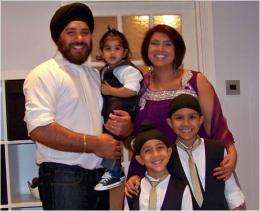More than 33,000 childhood cancer survivors living in the UK

An estimated 33,000 long-term survivors of childhood cancer - the vast majority of whom are cured - will be living in the UK by the end of 2012, according to new figures from Cancer Research UK.
The news underlines the tremendous progress that has been made in the fight against children's cancer over the past 50 years.
In the late 1960s fewer than three in 10 children survived their disease for at least five years. Today that figure has risen to almost eight in 102. But, there is still a need for better treatments to help more of the 1,600 children diagnosed with cancer each year in the UK survive the disease.
The assessment comes as Cancer Research UK launches its annual Little Stars Awards, in partnership with brands-for-less retailer TK Maxx, to recognise the bravery of children who have undergone cancer treatment.
Some types of childhood cancer have seen huge improvements thanks to research into new treatments.
For leukaemia, the most commonly diagnosed cancer in children, clinical trials have been at the heart of this progress. In the 1960s, there were very few treatments available for the disease but, since the 1970s, trials have tested the use of chemotherapy and other treatments. This has led to more than 80 per cent of children surviving their disease for five years or more.
The most common childhood liver cancer – hepatoblastoma - has also seen five year survival rates quadruple from around 20 per cent in the late 1970s to around 80 per cent today. Early trials focused on offering children new combinations of chemotherapy to treat the disease and, more recently, trials have looked at maintaining these improvements in survival rates while reducing the side-effects.

Professor Josef Vormoor, a Cancer Research UK childhood leukaemia expert in Newcastle, said: "What we've achieved for some childhood cancers, such as leukaemia, over the last 30 years has been fantastic. This has been thanks to researchers and doctors working together to trial new and improved treatments that offer children and their family's new hope of beating the disease.
"But, we urgently need better treatments for those children we can't cure yet, particularly for those with cancers such as neuroblastoma and some types of brain tumours. And, for cancers where treatments are successful we need more targeted drugs so that the children we treat can live full lives without any long term side effects."
To help more children survive cancer in the future Cancer Research UK is funding a range of trials and research projects.
In neuroblastoma, where 64 per cent of children survive their disease for five years or more, a pioneering therapy called immunotherapy is now being offered to children. This treatment uses the body's immune system to attack the cancer and recently a new trial was opened to offer this treatment to children with neuroblastoma that has returned who currently have few treatments available.
For a type of bone tumour called Ewing's sarcoma, where 64 per cent of children survive their disease for five years or more, Cancer Research UK is funding a trial that will test a combination of chemotherapy drugs to see if they are more effective and have fewer side effects than the standard treatments currently used.
Cancer Research UK's Little Star Awards, in partnership with TK Maxx, recognise the bravery and courage of children who confront cancer. Every child nominated receives the accolade in the form of a trophy and certificate signed by celebrities.
TK Maxx has supported Little Stars since 2008. To date they have raised a staggering £9 million to help beat children's cancers.
Eight-year old Amarvir Chatha, from Ilford, Essex, was diagnosed with acute lymphoblastic leukaemia in September 2011 and was so ill at one point it was touch and go whether he would survive.
Amarvir's mother Nikki, pictured below, said: "We couldn't believe it when we first heard Amarvir had leukaemia – those first 24 hours were the longest of our lives. But, thankfully he slowly responded well to the treatment and pulled through."
Amarvir has now finished his intensive treatment and is on maintenance treatment until January 2014. Earlier this year Amarvir received a Little Star Award.
Nikki added: "We came so close to losing Amarvir and we'll never forget that, we never take life for granted anymore. We owe his survival to the incredible advances that have been made in children's cancer research."
Professor Peter Johnson, Cancer Research UK's chief clinician, said: "Despite improvements in treatment, around 250 children still lose their lives to the disease each year in the UK. As a major funder of research into childhood cancers in the UK, Cancer Research UK is working towards a future where all children are cured of cancer. We're funding a range of trials to develop new treatments for cancers where we currently have few treatment options, such as aggressive neuroblastoma, and we hope these efforts will mean there are even more childhood cancer survivors in the UK in the years to come."















